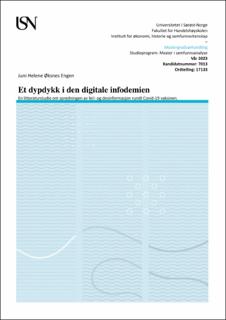| dc.contributor.advisor | Trond Løyning | |
| dc.contributor.author | Engen, Juni Helene Øksnes | |
| dc.date.accessioned | 2023-11-10T17:41:15Z | |
| dc.date.available | 2023-11-10T17:41:15Z | |
| dc.date.issued | 2023 | |
| dc.identifier | no.usn:wiseflow:6914269:55600989 | |
| dc.identifier.uri | https://hdl.handle.net/11250/3101994 | |
| dc.description.abstract | Sosiale medier er et mektig verktøy og brukes av millioner av mennesker hver eneste dag. Mange tar gjerne til sosiale medier for å finne og motta informasjon, hvilket gjør det til et godt egnet sted for å spre falsk og villedende informasjon (Medietilsynet, 2021). Hensikten med spredning av falsk informasjon kan variere, alt ut ifra hva den bakenforliggende intensjonen til avsender er, og det er dette som klargjør skillet mellom desinformasjon og feilinformasjon. Spredning av desinformasjon og feilinformasjon er noe som i lang tid har vært ansett som et problem. Særlig i lys av pandemien vi nettopp har vært gjennom har dette problemet fått stadig mer oppmerksomhet (Nasjonal sikkerhetsmyndighet, 2023).
Med pandemien fulgte også et ekstraordinært behov for informasjon, hvilket resulterte i det WHO refererer til som en infodemi (infodemic) (WHO, 2020). En infodemi forklares gjerne enkelt som en overflod av informasjon, og det fremstår i slike tilfeller vanskelig å skille ut hva som er korrekt og gal informasjon (Conger, 2021)
Avhandlingen tar for seg følgende problemstilling: “I hvilken grad har sosiale medier bidratt til spredningen av feil- og desinformasjon rundt Covid-19 vaksinen, og hvordan har dette påvirket tilliten i samfunnet?”, med tre tilhørende forskningsspørsmål, for å kunne optimalisere problemstillingen.
Studien tar utgangspunktet i en litteraturstudie, med litteratur innhentet fra tre ulike databaser. En litteraturstudie bygger på sekundærdata, hvilket tilsier at litteraturen som anvendes som empirisk grunnlag Aktuelle data fra denne litteraturen vil bli tolket ut fra et dobbelhermeneautisk perspektiv.
Oppgavens diskusjonsdel tar for seg de tre forskningsspørsmålene, og diskuterer disse opp imot det teoretiske rammeverket og de empiriske funnene. For å deretter diskutere problemstillingen og besvare denne. Studiens resultat og konklusjon viser til en sterk korrelasjon mellom spredningen av feil- og desinformasjon i sosiale medier og den generelle tilliten i samfunnet. | |
| dc.description.abstract | Social media is a powerful tool which is used by millions of people every day. More and more people use social media as a platform to seek and find information, which makes it a great place to spread false and misleading information. The intention of the spread of false and misleading information can often vary depending on the underlying intentions of the publisher. The dissemination of false and misleading information is something which has been viewed for a long time as a problem. Especially in light of the recent pandemic which generated a tremendous amount of focus on the issue (Nasjonal sikkerhetsmyndighet, 2023).
With the ongoing pandemic an immense amount of information was necessary, which in its due cause created a what the WHO referred to as the infodemic(WHO, 2020). An infodemic is often explained as an overflow or excessive amount of information and this creates an immensely difficult task to ascertain what is correct and false.
The thesis I have chosen is as follows “ to which degree can social media contribute to the spread of false and misinformation surrounding the Covid 19 vaccine, and to what extent has this had an effect on the trust with a society?” This is followed by three research questions in order to better optimize the thesis.
The study focuses on literature with research being primarily from three separate databases. One literature study is founded upon secondary data which is research based on others' work. Essential data from this literature will be interpreted from a double hermeneutic perspective.
The assignments discussion section will undertake the three research questions from the thesis and subject them to the theory presented in the text.
The theoretical framework will then be discussed against the findings in conjunction with the task of answering the thesis and research questions.
The result of the study and the arduous research done, shows a clear correlation between the spread of false and misinformation within social media and the effect it has on the general trust within society. | |
| dc.language | nob | |
| dc.publisher | University of South-Eastern Norway | |
| dc.title | Et dypdykk i den digitale infodemien | |
| dc.type | Master thesis | |
